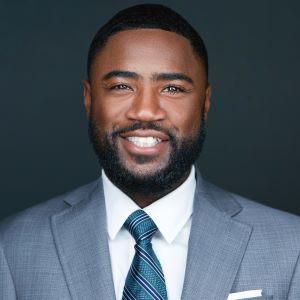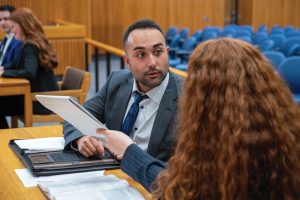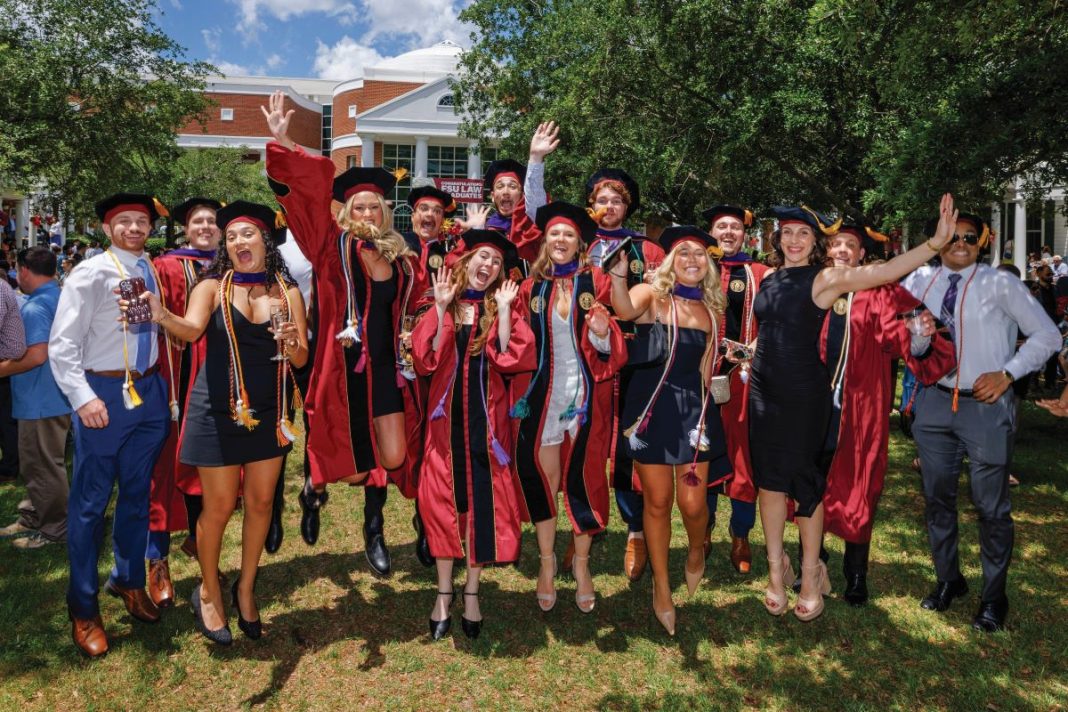When Landus Anderson walked across the graduation stage at Florida State University College of Law in May 2022, he knew he had a strong foundation.
Less than two years later, he’s sitting inside the offices of the Portland Trail Blazers as a lawyer and one of the legal engines keeping an NBA franchise running.
“It’s the absolute best launching pad and foundation one could have,” Anderson said of FSU Law. “If you really want to be successful, there’s no way you shouldn’t be. The resources are there; you just need to tap in.”
The foundation that Anderson speaks of at FSU Law includes value on multiple levels, earning the No. 1 spot on preLaw Magazine’s Best Value Law School ranking, moving up from No. 8 last year. The main differentiator was the cost factor.
Brigham Young University – J. Reuben Clark Law School maintained its spot at No. 2, and University of Georgia School of Law moved to No. 3 after earning the top spot last year.
To view the full ranking of the 2025 Best Value Law Schools, click here.
To create the list, preLaw ranked schools by assigning grades for each category, including the cost factor, and then determining an overall GPA. This year’s list included 10 newcomers, while three law schools fell off the ranking.
Formula for success

Anderson wasted no time at FSU Law. Even before his first semester, he reached out to professors to grab lunch and start building relationships.
On orientation day, he introduced himself to Justice Alan Lawson of the Florida Supreme Court after a speech. That quick conversation turned into coffee, then into an ongoing friendship.
Lawson later wrote letters of recommendation, invited Anderson to his home for dinner and even became his professor.
“Amazing connections and experiences can happen at any given moment at FSU Law,” Anderson said. “But you must be willing to ask and apply yourself.”
Anderson credits FSU Law’s Career Services and Professional Development office with sharpening his professional game and lightening his financial load.
He earned a scholarship from the Office of Admissions before arriving on campus, and career services made him aware of additional opportunities along the way.
“That made a huge difference,” he said. “It let me focus on building relationships and chasing opportunities instead of worrying about debt.”
Career services also helped him polish his professional presence. A former college basketball player, Anderson compared the job prep process to reviewing game tape.
“We would literally watch film of my interviews,” he said. “Perfecting my answers, my mannerisms, my hand gestures. They taught me how to pull organically from my experiences.”
That preparation paid off with on-campus interviews and, ultimately, a dream job in professional sports.
Anderson currently serves as assistant general counsel for corporate operations at the Portland Trail Blazers.
He advises basketball ops, HR, IT, finance, facilities and works with multiple entities under the Blazers’ umbrella.
360-degree approach
For Erin O’Hara O’Connor, dean of FSU Law, taking the top spot on our rankings for best value reflects a philosophy the school has embraced for years: combine affordability with opportunity and graduates will have the freedom to build the careers they truly want.
“Per dollar invested in their legal education, our students cannot and will not receive a better education and better opportunities,” Dean O’Connor said.
FSU Law has achieved something rare in higher education: Its in-state tuition has been frozen for 16 years.
While other schools raised rates year after year, FSU Law held the line, doubling down on raising scholarship dollars through an ambitious fundraising push. The result is a law degree that is nationally competitive and significantly more affordable.
Being in Tallahassee, Florida, plays a role in the value equation.
“The city offers a lower cost of living than many other state capitals or legal hubs,” Dean O’Connor said. “For out-of-state students, the financial advantage grows even stronger. With the right steps, they can qualify for Florida residency after their first year, converting to in-state tuition for the remainder of their studies.”
The payoff is clear: Graduates leave FSU Law with lighter debt loads, giving them the flexibility to pursue careers based on passion rather than paycheck.
Inside the classroom, FSU Law emphasizes small class sizes and faculty who remain accessible, creating an environment where students receive rigorous instruction paired with personal mentorship.
The school’s support system continues outside the classroom. The career services team takes a proactive approach, sometimes even personally delivering student resumes to firms and agencies rather than waiting for employers to show up at on-campus interviews. Alumni also step in as mentors, guiding students toward career paths and opening doors to opportunities.
Bar preparation begins early, with third-year courses tailored to exam content and weekly progress meetings during bar study season to keep students accountable.
The school also emphasizes wellness and foresight through its professionalism and identity programming. Students learn to manage stress, think beyond salary when evaluating offers, and envision careers that align with both their goals and their values.
“A student food pantry is stocked with quick meals so that even during the most stressful study weeks, students can focus on the bar exam rather than groceries,” Dean O’Connor said.
For graduates like Anderson, this wraparound support made a lasting impact.
He entered law school with a full scholarship but quickly discovered the value of FSU Law’s mentoring network and career guidance. Those connections gave him the confidence to lead the Student Bar Association and secure highly competitive clerkships.
“It wasn’t just one thing,” Anderson said. “It was knowing there was always someone — faculty, alumni or career staff — helping me take the next step.”
Opportunity redefined

Deans from four law schools — University at Buffalo School of Law, The State University of New York; University of Pittsburgh School of Law; The University of Tennessee Winston College of Law; and University of Kansas School of Law — shared how their institutions are tackling the affordability challenge while ensuring students graduate practice-ready. Their message to prelaw students: The best value is found where financial support, student services and career outcomes align.
UB School of Law is No. 18 on our list. The law school moved up the list with a grade of A- versus last year’s B+.
S. Todd Brown, dean of UB School of Law, said that value is about balance: giving students an adaptable legal foundation while keeping debt manageable.
“UB School of Law maintains one of the lowest tuition rates in the nation — about $26,000 for in-state students — and avoids conditional scholarships that can evaporate after the first year,” he said.
But UB School of Law goes beyond cost. Programs like Jump Start ease students into law school, while embedded financial, wellness and career counseling and peer mentoring provide support throughout. The Rally the Pass initiative offers free bar supplemental prep sessions, meals and study spaces, ensuring that finances don’t derail exam success, and coaching by the entire UB School of Law community.
For Dean Brown, outcomes define both value and success. With recent New York State bar passage rates topping 87% for first-time takers and employment exceeding 95% within 10 months of graduation, UB School of Law grads are proving the investment pays off.
“Ultimately, it’s the community that gets students across the finish line,” Dean Brown said.
Definition of value

Pitt Law is new to our list.
Jerry Dickinson, dean of Pitt Law, also defines value through outcomes: bar passage, employment and the ability to practice law with skill and integrity. To deliver that, Pitt Law emphasizes experiential learning through clinics, practicums and externships that give students a head start in professional settings.
“Students know they’re coming to Pitt Law to be trained as lawyers and to think like lawyers,” Dickinson said. “With an alumni network across Western Pennsylvania, students access externships at top firms, government agencies and nonprofits.”
Pitt Law is also making new investments in public interest careers. The recently launched Office for Public Interest guides students toward work in civil rights, democracy protection and nonprofit law.
“Financial aid is another priority; we raised a record $8 million in fundraising last year; some of those gifts will boost scholarships long term, ensuring students can pursue meaningful careers without being forced into high-paying jobs just to repay loans,” Dean Dickinson said.
Looking ahead, Pitt Law is preparing students for a changing profession, adding courses on artificial intelligence and ethical practice.
For Dean Dickinson, it all ties back to value: “It’s about return on investment — for students, their careers and the communities they will serve.”
Transformational gift for support
Making a jump on our list is the newly named University of Tennessee Winston College of Law at No. 13, moving up from No. 20 last year.
When Lonnie Brown Jr. became dean of Winston Law, he set affordability as a top priority. Under his leadership, scholarships have increased, and the tuition gap between in-state and out-of-state students has significantly diminished. But the turning point came with a $32.5 million naming gift from The Bill Gatton Foundation, which is now elevating what value means at Winston Law.
The gift established an endowment (already fully funded), the income from which will be used to support up to six full-tuition-plus fellowships each year in public interest and business law and $1,000 annual recurring grants for 50 students per class, as well as funding for bar prep, summer employment opportunities and other areas to address student financial needs.
“It’s really transformational,” Dean Lonnie Brown said. “The gift and naming will enhance our brand and raise our profile, while ensuring that students are able to receive high-quality preparation for practice at an affordable cost.”
For students, the impact is both financial and personal. Less debt means more freedom to pursue careers aligned with passion rather than paycheck.
“Lowering the economic burden of law school reduces stress and gives students the freedom to pursue the career that aligns with their values, goals and happiness,” Dean Lonnie Brown said.
As changes to federal student loan lending loom, he believes affordability will weigh even more heavily in decision-making.
“Students are going to have to be more intentional and analytical about their law school choices, placing a premium on what constitutes the most valuable return on investment,” he said. “And Winston Law intends to stand out as an ideal investment, where quality and affordability meet.”
True meaning of value

At KU School of Law, Dean Stephen Mazza frames value as a combination of affordability and comprehensive student support. That starts with bar prep, often a hidden expense for graduates.
“Thanks to alumni contributions, KU School of Law provides every student a free Themis bar prep course, plus diagnostics, classes and early-start programs that have driven bar passage rates higher,” Dean Mazza said.
Career services also begins on day one. Students meet individually with staff to map out goals, with stipends available for public service jobs or travel for out-of-state interviews.
“KU School of Law’s faculty bring both scholarly impact and practical innovation, from integrating AI into legal research to providing clinical experiences that connect classroom learning with real clients,” he said.
Financial education is another cornerstone. KU School of Law recently created an in-house financial counseling office tailored to law students, offering budgeting workshops and one-on-one guidance.
“Small gestures matter,” Dean Mazza said. “Each year, I take 1Ls on a tour of affordable restaurants to reinforce that every student belongs at KU School of Law, regardless of financial background.”
The results speak for themselves. Graduates leave KU School of Law with manageable debt, stronger bar passage rates and diverse career outcomes.
“A law degree should give you freedom,” Mazza said. “Low debt means you can choose the career you want, not the one you feel forced into.”
Formula for success
Looking ahead, Dean O’Connor believes the definition of “best value” will only become more important as technology reshapes the profession.
Starting salaries may plateau and competition for jobs could increase. FSU Law is preparing students for that future by integrating legal technology into its curriculum and partnering with startups to test new software. The goal is to graduate lawyers who not only understand the law but can also help employers evaluate and implement the tools that will shape the future of practice.
“In the next decade, students will need to ask not only what they’re investing, but also what opportunities that investment creates,” Dean O’Connor said. “At FSU Law, we’re keeping costs down while expanding opportunities and that includes preparing students for the next wave of legal practice.”
Anderson’s story embodies the freedom that comes with graduating debt-free. He is quick to point out that none of this happened by accident. His formula for success is straightforward: use the resources, network relentlessly and leverage the world around you to broaden your perspective. Though he had the credentials to attend top law schools across the country, he chose FSU Law for its financial and professional advantages.
“Financial counseling makes the cost of law school tangible, showing students how decisions like living alone or with a roommate affect their long-term debt,” Dean O’Connor said. “FSU Law takes a ‘360-degree’ approach, preparing students academically, professionally and financially for the realities of life after law school.”
Anderson thrived at FSU Law, leading organizations, excelling academically and earning offers from major firms. But when private practice didn’t give him the sports law opportunities he wanted, he wasn’t trapped. Because he had no debt, Anderson could pivot, leaving behind a prestigious firm to pursue his dream: legal counsel for the Portland Trail Blazers.
“That freedom to choose came from minimizing debt,” Dean O’Connor said. “It allowed him to follow his passion instead of being boxed in by financial pressure.”
Dean O’Connor’s advice is straightforward: Balance is everything.
“A generous scholarship at a school that won’t launch you to where you want to go isn’t enough. And a school with great programs but crushing debt may limit your options later,” she said. “You want a well-rounded school that gives you the flexibility to pivot.”


